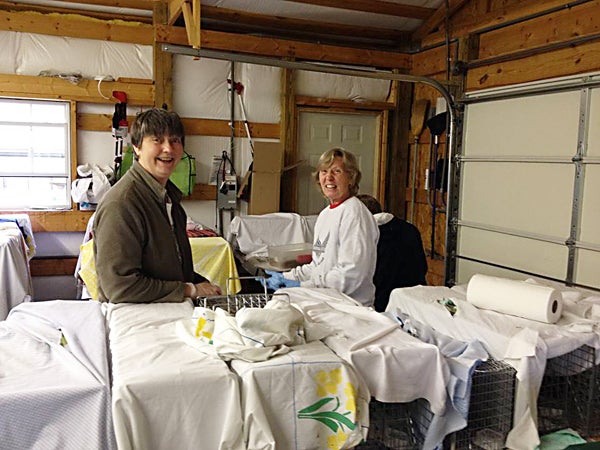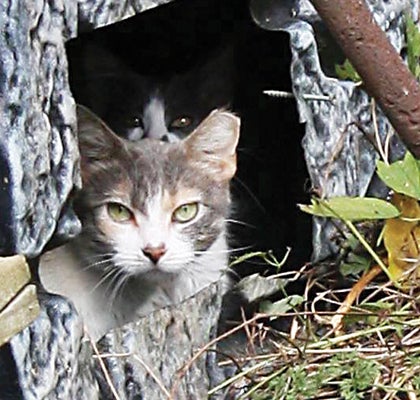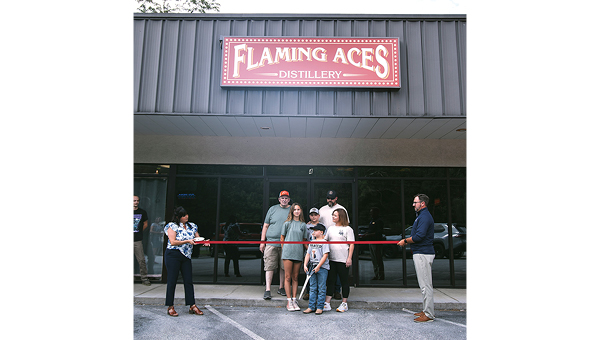Local organization offers humane solution to abundance of community cats
Published 8:48 am Friday, April 1, 2016

Contributed Photo
Danika Nadzan of East Tennessee Spay/Neuter and Becky Calvert provide excellent cat care.
While the community has been educated to believe that reporting stray community cats to the animal shelter will improve the cats’ quality of life, Judy King, founder of Appalachian Feral Cat Allies (AFCA), shares another side of the story.
Domestic, social cats and feral, fearful cats, are two different animals, she said.
“Feral cats do not want to be inside in close contact with humans, but they know they have to live close to people because it’s a food source,” said King. “They cannot sustain themselves on birds or rodents because of the numbers, but for thousands of years cats have lived alongside humans.”
Though people feel that surrender to the shelter will increase adoption or save the cats from the elements, she said the reality for feral cats is euthanasia. She said this is not mismanagement by shelter staff, but it is the only way they can manage the large number of cats which are surrendered to the shelter.
These feral cats are not socialized with humans, and she said they are therefore considered unadoptable.
“Cats who have a home in the community should not go in; the shelter should always be the last alternative,” said King “Our program is not adding cats, they were already there.”
King founded the non-profit AFCA in 2011, and since then, has trapped, spayed or neutered and returned approximately 3,200 cats in Carter, Unicoi and Washington Counties.
She traps and transports cats weekly to Margaret Mitchell Spay and Neuter Clinic, and four to five times annually, transports others to the University of Tennessee for a “Fixin’ Clinic.”
She will take 65 cats to UT on April 9. In the past, she has taken more than 100 cats almost every time.
King said the problem many people have with allowing the cats to roam is that they reproduce, which involves a slew over other nuisances like cats fighting and urinating to acquire territories and mate. However, she said the trap and kill methods that have been implemented for years are ineffective, as the cat population has not decreased.
“When cats are removed or relocated from an area, other cats move in,” she said. “There’s a thing called the vacuum effect, meaning the density of the problem is so great, that if you relocate a colony or eradicate it, within six months, another group of cats will move in, so you didn’t solve the problem.”
She said people call every year for Animal Control to come eradicate cats from roaming their property. When she asked one man why he thought the cats kept coming, he said the Animal Control officer is not doing his job.
“I said, ‘No, there are just so many cats looking for new territory, so trap and kill does not solve the problem, and neither does relocating,’” said King.
She said the best deterrent to other unfixed cats coming in is to spay and neuter the current cat colony so that they will not reproduce and will end the annoying mating habits, which cause most people’s complaints.
“There are typically more unowned cats in a community than owned cats,” said King.

Contributed Photo
AFCA’s mission is to keep feral cats in their communties while reducing the rates of reproduction and simultaneously reducing the disturbances caused to residents.
With most cat colonies, humans are providing part of the cats’ diets, and when those cats are spayed or neutered, King said allowing them to remain in the community becomes a sustainable, cost effective solution.
“It is cheaper to have that animal fixed than to kill it,” said King. “It is also cheaper to help it with food, than to take it away from its home. There are so many cats and so little space.”
She said the Elizabethton/Carter County Animal Shelter (ECCS) has had a major turnaround in the last three years by educating the community, asking callers if the cat can stay till AFCA can trap, fix and return it, or asking people if they can foster cats. This frees up space in the shelter and saves lives, King said.
“Sometimes you can address the issue with resources and alternatives, and that is the way to go,” said King.
When the shelter is overwhelmed with cats, she said more cats are euthanized, costs to house them are higher, and staff turnover rates increase.
“Feral cats get put down at the shelter, and an estimated 70 percent of all cats fall under the ‘community cat’ label. That means they are feral, stray, abandoned or free roaming without an immediate owner or ID available,” said King. “And all of them are killed, so that’s a huge strain on taxpayers. Many people say they take them to the shelter to get them adopted, but they’re not adoptable; they’re afraid.”
Not only are they fearful and unsocialized, but she said they become stressed and lose weight at the shelter and often develop upper respiratory infections.
In 2015, all cats at the Washington County Animal Shelter were euthanized due to insurmountable rates of upper respiratory infection.
While ECCAS goes to great lengths to quarantine cats and to treat infection, efforts are not always successful. King said higher populations of cat intake only add to the problem.
People want to know what can be done, she said
“Most people are in favor of reducing euthanasia rates, and that is tied to shelter intake. There’s no way around it; you cannot adopt your way out of it,” said King. “So to reduce intake, we see what’s coming in and what alternatives exist.”
She said that by determining what issues are bringing the cats to the shelter door, they can determine how to provide alternative services that take a holistic approach to the problem. She said AFCA is on the offense with its trap-neuter-return program, because it typically eliminates the irritation to homeowners and prevents more cats from breeding in their areas.
“Trap-neuter-return increases adoption,” King said. “We’re not adding to the community, were returning to the community a rather low profile cat with a changed demeanor.”
She said a life-affirming attitude saves the cats and relieves the people whose communities accommodate their natural colonies. She said residents can use a number of humane methods of rerouting the cats’ trails off of their properties without having to kill or relocate them. Some of these include a device called a Scarecrow, which attaches to a water hose, or Catstop, which emits a sounds that deters cats.
“My goal has always been to help people see, or shift their perspective on community cats or cats in general,” said King.
Though King said her program is directing money in a more positive, effective way, she said she cannot do it alone. She traps cats weekly, transports them to a clinic and returns them to the area where they were trapped.
“It’s a huge undertaking,” said King.

Contributed Photo
King transports cats for spay and neuter safely in this bus and then returns them to the sites from which they came.
She receives individual contributions, but still finances more than half of the cost of the program. She said ECCAS, Unicoi County Animal Shelter and East Tennessee Spay and Neuter have been immensely supportive and have assisted with networking and promoting the cause, but because AFCA does not receive any state or federal funding, she is always in need of supporters and volunteers.
Volunteers may donate sheets or newspapers, sort newspapers, transport cats, or assist with cleaning traps and trapping. Monetary donations are always encouraged, King said, as it costs $45 to neuter, $60 to spay, $66 to purchase another humane live trap and $20 to purchase antibiotics for a cat with upper respiratory or other infections.
Though she said it isn’t easy to tell the difference in a feral cat and a socialized cat, the American Society for the Prevention of Cruelty to Animals provides seminars to shelter staff. King advised to residents that a feral cat will behave fearfully, turning its back, tucking its tail and hiding. A socialized cat will likely have its tail up and may approach a human. Some cats are naturally shy, though so knowing whether to call AFCA or the shelter can be confusing. King said she can offer advice, and those with inquiries are welcome to call. She reminded residents that feral cats are not aggressive, they are simply fearful.
“They only become aggressive if they feel they have to protect themselves; they’re frightened of humans,” said King.
If residents of Carter or Unicoi Counties want to report a cat to AFCA, they should call King at 423-743-7081.
For more information, or to donate or volunteer, visit www.afcatn.org or www.etnspay-neuter.org.





